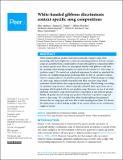Files in this item
White-handed gibbons discriminate context-specific songs compositions
Item metadata
| dc.contributor.author | Andrieu, Julie | |
| dc.contributor.author | Penny, Samuel G. | |
| dc.contributor.author | Bouchet, Hélène | |
| dc.contributor.author | Malaivijitnond, Suchinda | |
| dc.contributor.author | Reichard, Ulrich H. | |
| dc.contributor.author | Zuberbühler, Klaus | |
| dc.date.accessioned | 2020-08-03T14:30:12Z | |
| dc.date.available | 2020-08-03T14:30:12Z | |
| dc.date.issued | 2020-08-03 | |
| dc.identifier | 268623761 | |
| dc.identifier | 18d0ee07-8bd9-4eff-be45-a812b7a8280d | |
| dc.identifier | 000554824100001 | |
| dc.identifier | 85090631069 | |
| dc.identifier.citation | Andrieu , J , Penny , S G , Bouchet , H , Malaivijitnond , S , Reichard , U H & Zuberbühler , K 2020 , ' White-handed gibbons discriminate context-specific songs compositions ' , PeerJ , vol. 8 , e9477 . https://doi.org/10.7717/peerj.9477 | en |
| dc.identifier.issn | 2167-8359 | |
| dc.identifier.other | ORCID: /0000-0001-8378-088X/work/78527561 | |
| dc.identifier.uri | https://hdl.handle.net/10023/20398 | |
| dc.description | This research project has been funded by the Leverhulme Trust (Research Leadership Award F/00268/AP), the European Research Council (grant number FP7; PRILANG GA283871) and the Swiss National Science Foundation (310030_185324). | en |
| dc.description.abstract | White-handed gibbons produce loud and acoustically complex songs when interacting with their neighbours or when encountering predators. In both contexts, songs are assembled from a small number of units although their composition differs in context-specific ways. Here, we investigated whether wild gibbons could infer the ‘meaning’ when hearing exemplars recorded in both contexts (i.e. ‘duet songs’ vs. ‘predator songs’). We carried out a playback experiment by which we simulated the presence of a neighbouring group producing either its duet or a predator song in order to compare subjects’ vocal and locomotor responses. When hearing a recording of a duet song, subjects reliably responded with their own duet song, which sometimes elicited further duet songs in adjacent groups. When hearing a recording of a predator song, however, subjects typically remained silent, apart from one of six groups which replied with its own predator song. Moreover, in two of six trials, playbacks of predator songs elicited predator song replies in non-adjacent groups. Finally, all groups showed strong anti-predator behaviour to predator songs but never to duet songs. We concluded that white-handed gibbons discriminated between the two song types and were able to infer meaning from them. We discuss the implications of these findings in light of the current debate on the evolutionary origins of syntax. | |
| dc.format.extent | 23 | |
| dc.format.extent | 9268901 | |
| dc.language.iso | eng | |
| dc.relation.ispartof | PeerJ | en |
| dc.subject | Duet song | en |
| dc.subject | Predator song | en |
| dc.subject | Playback experiment | en |
| dc.subject | Syntax | en |
| dc.subject | White-handed gibbons | en |
| dc.subject | QL Zoology | en |
| dc.subject | BF Psychology | en |
| dc.subject | DAS | en |
| dc.subject.lcc | QL | en |
| dc.subject.lcc | BF | en |
| dc.title | White-handed gibbons discriminate context-specific songs compositions | en |
| dc.type | Journal article | en |
| dc.contributor.sponsor | The Leverhulme Trust | en |
| dc.contributor.institution | University of St Andrews. Institute of Behavioural and Neural Sciences | en |
| dc.contributor.institution | University of St Andrews. Centre for Social Learning & Cognitive Evolution | en |
| dc.contributor.institution | University of St Andrews. School of Psychology and Neuroscience | en |
| dc.identifier.doi | 10.7717/peerj.9477 | |
| dc.description.status | Peer reviewed | en |
| dc.identifier.grantnumber | F/00 268/AP | en |
This item appears in the following Collection(s)
Items in the St Andrews Research Repository are protected by copyright, with all rights reserved, unless otherwise indicated.

